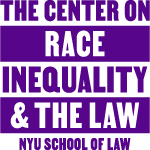Student Summer 2025 Fellowship Program
Posted: November 26, 2024
Description:
The Center on Race, Inequality, and the Law engages in research, public education, advocacy, organizing, and litigation, through an abolitionist lens, to advance its mission of challenging racial injustice in all its forms and shaping how people understand, diagnose, and address issues of race and inequality across all sectors of our society. We are seeking applications from 1L, 2L, and LLM students for our summer Student Fellowship Program, to take place during the summer of 2025.
Student Fellows will conduct research into topics around race and inequality for use in advocacy, litigation, and public education under the guidance and supervision of Center leadership; assist with the planning and execution of the Center’s events; and otherwise contribute to the Center’s community-facing work more generally. Student Fellows will be expected to apply for PILC funding to secure financial support for the duration of the summer fellowship. Student Fellows may have the opportunity to meet and work with practitioners, advocates, and scholars engaged in work within the racial justice space. The expected time commitment is an average of 40 hours per week over 10 weeks. Over the course of the summer, Student Fellows will have the opportunity to work to varying degrees with the Center’s Faculty Directors, Executive Director, and post-graduate fellows.
If you are interested, please submit the following materials via email and in a single PDF, with the subject line “Summer 2025 Student Fellow Application,” to law.race.inequality@nyu.edu:
-
Cover letter explaining why you would like to become a Student Fellow of the Center and your interest in race and inequality;
-
Resume;
-
Unofficial law school transcript; and
-
List of two references with email addresses
Applications will be accepted on a rolling basis. Interviews will be conducted on a rolling basis and selections will be made no later than February 28, 2025. NYU School of Law seeks to recruit and retain a diverse workforce. All qualified applicants will receive consideration for employment without regard to race, color, religion, sex, sexual orientation, gender identity, national origin, disability, age or protected veteran status. To learn more about the Center on Race, Inequality, and the Law, visit http://www.law.nyu.edu/centers/race-inequality-law.
